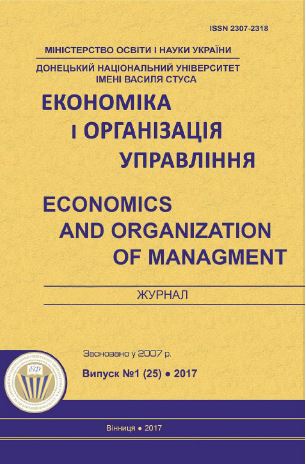The phenomenon of post-industrial society and the basic concepts of its development.
Keywords:
international economic relations, scientific and technological revolution, world economy, economic differentiation of countries, economic development, post-industrial society, theory of social capital and quality of lifeAbstract
The article discusses five basic concepts of formation of a postindustrial society, which determine the status and features of the socio-economic and scientific-technical development of international economic relations at the present time. On their basis, the most significant objectives of his transformation, considering the alignment of all aspects of the development of the world economy and balanced growth in the context of globalization of world economic relations. Reflects the negative impact of the global redistribution of capital to ensure the highest standards of living in developed countries as opposed to developing. The logic of such a development may lead to confrontation between developed and developing countries, including through armed conflict. Suggested alignment of the specified imbalance by strengthening the norms of international law and other institutions of supranational regulation (UN, IMF, Interpol, UNESCO, WHO) aimed at solving economic and environmental problems of mankind.References
Белл Д. Грядущее постиндустриальное общество. Опыт социального прогнозирования. – М.: Academia, 1999. – 956 с.
Гэлбрейт Дж. Новое индустриальное общество: Пер. с англ. / Дж. Гэлбрейт. – М.: ООО «Издательство АСТ»: ООО «Транзиткнига»; СПб.: Terra Fantastica, 2004. – 602 с.
Друкер П. Задачи менеджмента в XXI веке.: Пер. с англ.: – М.: Издательский дом «Вильямс», 2004. – 272 с.
Турен А. Возвращение человека действующего. Очерк социологии. – М.: Научный мир, 1998. – 204 с.
Конец истории и последний человек / Φ Фукуяма, Пер. с англ. M Б Левина – M ООО «Издательство ACT: ЗАО НПП «Ермак», 2004. – 588 с.
Капелюшников Р. А. Вклад Гэри Беккера в экономическую теорию / Беккер Г. С. Человеческое поведение: экономический подход. Избранные труды по экономической теории. – М.: ГУ ВШЭ, 2003. – С. 645-671.
Портер. М. Международная конкуренция: Конкурентные преимущества стран. – М.: Международные отношения, 1993. – 896 с.

